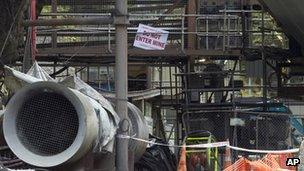Collapse 'may have caused NZ Pike River mine blast'
- Published

The commission of inquiry into the Pike River mine blast is taking place in Greymouth
A rock fall that released methane gas may have triggered the deadly Pike River mine blast in New Zealand, experts say.
Officials told a commission investigating the incident that water pumps probably ignited the gas when they were switched on.
The explosion on 19 November 2010 in the mine on New Zealand's South Island killed 29 workers.
It was New Zealand's worst mining disaster in almost a century.
Royal Commission of Inquiry counsel James Wilding said determining the cause of the explosion had proved challenging because no one had been inside the mine since the incident.
But experts said that the preferred theory was that a collapse of the mine's roof in the "goaf" - the void left behind after coal is removed - released methane into the mine.
The Labour Department's Brett Murray told the commission that turning on a water pump that had been offline for maintenance after the collapse likely sparked the explosion.
The commission findings have been largely based on the Labour Department's report on the disaster. At least 13 investigators worked on the case in the first nine months after the blast.
Three parties, including a former mining boss, have been charged in connection with the disaster.
Mining company Pike River Coal will face 10 charges, and drilling firm VLI has been charged with three offences - all relating to safety standards.
- Published11 November 2011
- Published27 January 2011
- Published24 November 2010
- Published24 November 2010
- Published14 October 2010